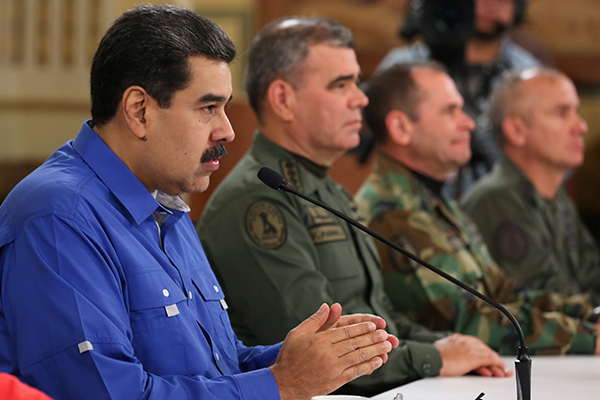
By Inés San Martín
ROSARIO, Argentina (Crux) — The Venezuelan bishops are warning parliamentary elections called by President Nicolás Maduro for Dec. 6 will aggravate the political and economic crisis in the country.
In a statement released on Dec. 1, the Venezuelan Bishops Conference said that “the people certainly yearn for a peaceful change in the situation, for which they want to express themselves with the vote, under fair conditions, equitable and equality for the parties.”
However, they argued, the “electoral event convened for next Dec. 6, far from contributing to the democratic solution of the political situation we are experiencing today, will aggravate it and won’t help solve the real problems of the people.”
They likewise reiterated their appeal for the various civil society groups to continue in their “joint efforts to reestablish the democratic rights of the nation.”
Maduro took power after President Hugo Chavez died from cancer in 2013, but has failed to gain his predecessor’s popularity. Ever since the opposition took control of the country’s National Assembly in 2015, Maduro has used the courts to strip the body of its legislative power.
Among the initiatives the underlined as positive is the “popular consultation” that Juan Guaido, leader of the opposition. On January 2019, the opposition-led National Assembly swore Guaido as acting President of Venezuela, challenging Maduro’s presidency after what many international organizations labeled a fraudulent re-election of the successor of Hugo Chavez.
Guaido has received formal recognition of legitimacy from almost 60 governments worldwide, including the United States, Canada and various Latin American and European countries.
Other countries, including Russia, China, South Africa, Iran, Syria, Cuba and Turkey have continued to recognize Maduro.
“The people have the full right to express themselves through the legitimate channels guaranteed by the Constitution, expressing their opinion as an authentic social subject,” the bishops wrote on the consultation called for by Guiado.
They also wrote that “as citizens of this country,” they invite to a “serious discernment that leads us to the search of a just, peaceful and democratic solution to the multiform crisis that affects Venezuela, that is agreed to by all Venezuelans.”
“We cannot be overcome by discouragement,” they wrote. “On the contrary, we must continue to do everything possible and work for the unity, peace and prosperity of the nation, putting the common good as a priority over any other interest.”
Speaking about the Dec. 6 elections, they argue that even though the people have a right to express themselves, when the all sides have their backs to each other, and are unwilling to recognize and accept the other, any outcome of the vote would only “strengthen the confrontation,” instead of being a path towards a sincere solution involving everyone.
“Without encounter, without mutual recognition and without authentic dialogue, there will be no solution that brings well-being and fraternity,” they wrote.
For several years, Venezuela has been in a deep economic crisis, with hyperinflation and high unemployment leading to millions of Venezuelans not being able to put food on the table. According to the World Bank, 87 percent of the population of Venezuela is living below the poverty line.
The coronavirus pandemic has made the situation much worse.
For several years now, the bishops of Venezuela – with the backing of the Vatican – have asked the Maduro regime to open humanitarian corridors so that international aid can be distributed.
However, the president refuses to acknowledge there is a crisis, and only allows aid to come from Russia, China, Cuba, Iran, and a handful of other countries.
According to the United Nations, 4.5 million Venezuelans have fled the country, an estimated 12 percent of the population.
CARE, a global NGO, released a report in late 2019 saying that thousands of children are at risk of dying from malnutrition, and people are contracting formerly eradicated diseases such as measles.
